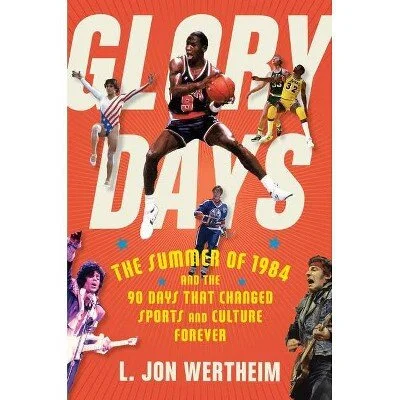Book Review: Glory Days by L Jon Wertheim
Momentous events are not evenly distributed throughout history, and the same principle applies to sports. Fans need not look any further than the 2000 NBA Draft, which featured a crop of players who produced an average number of wins below replacement level. That essentially means that first-overall pick Kenyon Martin (arguably the best player in retrospect) and friends effectively made the NBA less talented through their entry into the NBA. Meanwhile, three years later LeBron James, Carmelo Anthony, Chris Bosh, and Dwayne Wade would go in the draft’s top five. The summer of 1984 is the “2003 NBA Draft” of random three-month periods for sports: it saw the ascendance of Michael Jordan as he made early inroads into superstardom, a patriotism-heavy, exciting, and lucrative summer Olympics in Los Angeles, Wayne Gretzky winning his first Stanley Cup, and a variety of other developments that dramatically shaped athletics for decades to come. In Glory Days, longtime Sports Illustrated writer L. Jon Wertheim chronicles these events and their long-term impact on sports with some additional insights on developments in the broader entertainment space that also occurred during the period. It is a fun and well-written reflection on the period and enjoyable even if it’s not adding a ton of new insights.
Each chapter of Glory Days is structured around one topic in sports or entertainment. Most of the subjects are multi-chapter affairs, as Wertheim ends up returning several times to the 1984 Olympics, Michael Jordan, while there are a few topics like professional wrestling that are one-offs. The interweaving of multiple narratives helps keep things fresh and also allows things to proceed somewhat chronologically across the summer.
Glory Days does more than simply recount some fun memories from 1984. He also examines some big decisions from the summer that influenced entertainment for years to come: the US Olympics Committee deciding to loosen amateur restrictions for the 1984 and paving the way for the Dream Team, ESPN opting to charge affiliates fees to air the channel which eventually helped drive humongous growth, and the NBA shifting to a more reporter-friendly Finals format that helped earn the 1984 Finals the highest TV ratings to-date. And while Wertheim does spend some time recounting basic facts about some of these topics, he also chucks in some interesting factoids that were at least news to me, like how Wayne Gretzky was apparently friends with Andy Warhol (and Warhol was apparently also a big fan of professional wrestling) and sprinter Carl Lewis was drafted in both the 1984 NBA and NFL Drafts despite never playing either sport competitively.
Wertheim was 13 in 1984 and writing Glory Days was clearly a labor of love. That generally works in the book’s favor as Wertheim’s passion is evident on each page but it also means there is arguably too much time dedicated to Wertheim’s pet interests (a good portion of the book is dedicated to Wertheim’s favorite team the Chicago Cubs and his favorite sport of tennis which both were not really that interesting in the summer of 1984 specifically). There are also several chapters that try to shoehorn entertainment developments such as the release of The Karate Kid and a major Michael Jackson tour that occasionally came off as clunky within the context of the broader book but are still fun reads even if they offer more surface-level analysis. A lot of Glory Days is not going to be earth-shattering for sports fans with some knowledge of the eighties (I warn born six years after 1984 but still had a basic familiarity with most of the topics covered), but Wertheim still offers a fun and well-written trip down memory lane that makes for an excellent summer read.

